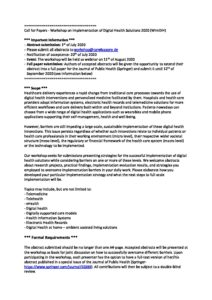=====================================
Call for Papers – Workshop on Implementation of Digital Health Solutions 2020 (WImDiH)
*** Important Information ***
– Abstract submission: 1st of July 2020
– Please submit all abstracts to workshop@care4saxony.de
– Notification of acceptance: 20th of July 2020
– Event: The workshop will be held as webinar on 11th of August 2020
– Full paper submission: Authors of accepted abstracts will be given the opportunity to extend their abstract into a full paper for the Journal of Public Health (Springer) and submit it until 12th of September 2020 (see information below)
=====================================
*** Scope ***
Healthcare delivery experiences a rapid change from traditional care processes towards the use of digital health interventions and personalized medicine facilitated by them. Hospitals and health care providers adopt information systems, electronic health records and telemedicine solutions for more efficient workflows and care delivery both within and beyond institutions. Patients nowadays can choose from a wide range of digital health applications such as wearables and mobile phone applications supporting their self-management, health and well-being.
However, barriers are still impeding a large-scale, sustainable implementation of these digital health innovations. This issue persists regardless of whether such innovations relate to individual patients or health care professionals in their working environment (micro level), their respective wider societal structure (meso level), the regulatory or financial framework of the health care system (macro level) or the technology to be implemented.
Our workshop seeks for submissions presenting strategies for the successful implementation of digital health solutions while considering barriers on one or more of these levels. We welcome abstracts about research projects, practical findings, implementation evaluation results, and strategies you employed to overcome implementation barriers in your daily work. Please elaborate how you developed your particular implementation strategy and what the next steps to full-scale implementation will be.
Topics may include, but are not limited to:
– Telemedicine
– Telehealth
– eHealth
– Digital health
– Digitally supported care models
– Health Information Systems
– Electronic Health Records
– Digital Health at home – ambient assisted living solutions
*** Formal Requirements ***
The abstract submitted should be no longer than one A4-page. Accepted abstracts will be presented at the workshop as basis for joint discussion on how to successfully overcome different barriers. Upon participating in the workshop, each presenter has the option to have a full-text version of her/his abstract published in a special Issue of the Journal of Public Health (Springer- https://www.springer.com/journal/10389). All contributions will then be subject to a double-blind review.
For further information regarding the workshop and subsequent publication opportunities, please contact us via workshop@care4saxony.de.
*** Co-Chairs ***
Peggy Richter
Technische Universität Dresden, Faculty of Business and Economics, Germany
Brief Bio: Peggy Richter graduated at the TU Dresden with a master’s degree in Information Systems Research (Wirtschaftsinformatik) in 2013. She is research associate in the Digital Health group “Helict” at the Chair of Wirtschaftsinformatik, esp. Systems Development at TU Dresden. Currently, she is a member of the ESF-funded junior research group Care4Saxony and working in the European Joint Action iPAAC (Innovative Partnership for Action Against Cancer). Her research interests include application and theories on conceptual modeling, patient pathway modeling and digital solutions to support patient-centered, integrated care implementation, as well as process-based quality management.
Lorenz Harst
Technische Universität Dresden, Medical Faculty Carl Gustav Carus, Germany
Brief Bio: Lorenz Harst graduated from TU Dresden with a master’s degree in Applied Media Science in 2016. He is a research associate at the Research Association Public Health at the Center for Evidence-based Healthcare at the University Clinic and Medical Faculty Carl Gustav Carus and also heads the clinic’s task force for the national network of University Clinics for COVID-19. His research interests include user-centered development, implementation and evaluation of digital healthcare solutions, especially for targeted health communication strategies.
*** Workshop Program Committee ***
- Alexander Gleiß, University of Potsdam, Germany
- Lena Otto, TU Dresden, Germany
- Lua Perimal-Lewis, Flinders University, Adelaide, Australia
- Hannes Schlieter, TU Dresden, Germany
- Patrick Timpel, TU Dresden, Medical Faculty Carl Gustav Carus, Germany
- Bastian Wollschlaeger, TU Dresden, Germany
